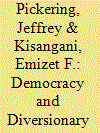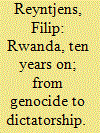| Srl | Item |
| 1 |
ID:
060419


|
|
|
|
|
| Publication |
Mar 2005.
|
| Summary/Abstract |
This article concentrates on two limitations in the literature on diversionary force. First is the common assumption that major powers are the only actors capable of diversion. Second is the narrow conceptualization of regime type prevalent in the literature. Instead of dichotomizing regimes, we distinguish mature democracies and autocracies from consolidating variants of these regimes. We draw hypotheses from the institutional approach and test them with time series cross-section negative binomial first-order autoregressive process estimates of 140 countries from 1950 to 1996. We find that not all democracies and not all autocracies divert. Mature democracies, consolidating autocracies, and transitional polities are the only regime types prone to this type of force. Our results suggest that the diversionary literature would benefit from more discriminating operationalizations of regime type and by looking beyond major powers to the actions of less powerful states.
|
|
|
|
|
|
|
|
|
|
|
|
|
|
|
|
| 2 |
ID:
023315


|
|
|
|
|
| Publication |
2002.
|
| Description |
77-87
|
|
|
|
|
|
|
|
|
|
|
|
|
|
|
|
| 3 |
ID:
051892


|
|
|
|
|
| Publication |
April 2004.
|
| Summary/Abstract |
Ten years after the 1994 genocide, Rwanda is experiencing not democracy and reconciliation but dictatorship and exclusion. Although the government led by the Rwanda Patriotic Front has achieved rapid institutional reconstruction and relatively good bureaucratic governance, it has also concentrated power and wealth in the hands of a very small minority, practised ethnic discrimination, eliminated every form of dissent, destroyed civil society, conducted a fundamentally flawed 'democratization' process, and massively violated human rights at home and abroad. The Rwandan army twice invaded neighbouring Zaire-Congo, where its initial security concerns gave way to a logic of plunder. It has caused protracted regional instability and derailed the transition process in the Democratic Republic of Congo. The Rwandan government has succeeded in avoiding condemnation by astutely exploiting the 'genocide credit' and by skilful information management. The international community has been complicit in the rebuilding of a dictatorship under the guise of democracy. It assumes a grave responsibility in allowing structural violence to develop once again, just as before 1994. In years to come, this may well lead to renewed acute violence.
|
|
|
|
|
|
|
|
|
|
|
|
|
|
|
|